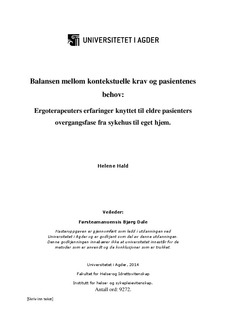Balansen mellom kontekstuelle krav og pasientenes behov : ergoterapeuters erfaringer knyttet til eldre pasienters overgangsfase fra sykehus til eget hjem
Master thesis
Permanent lenke
http://hdl.handle.net/11250/275833Utgivelsesdato
2014Metadata
Vis full innførselSamlinger
Sammendrag
Background and aim: Coping in daily activities when discharged from hospital to own home can be challenging for older people. Internationally, there is a number of studies on this topic, but similar studies in Norway and Nordic countries seem to be scarce. The aim of this study was to illuminate occupational therapists’ experiences of how to promote coping of daily activities in older patients who are discharged from hospital to home.
Methods: A qualitative design with individual interviews was used. A purposive sample of eight occupational therapists were included, four worked in hospitals and four in community health services, respectively. Initially the interviews had an open form, but a semi-structured interview guide was also used. Data were analyzed using qualitative content analysis.
Findings: Three main categories emerged from the interviews: “to facilitate for activities on an individual level”, “potentials in the patient’s environments” and “interaction between service levels”. A main theme was “to find a balance between patients’ needs and contextual requirements in vulnerable and complex transitions”. The subthemes were: "the importance of activity for a meaningful life" and "to see the older person both individually and in a larger context."
Conclusion: The study showed that occupational therapists may promote coping of daily activities in elderly patients discharged from hospital to home. However, organizational factors, interaction between service levels, and individual-oriented approaches with patient surroundings affect the process and outcome. The study also showed that to balance the patient's individual needs and the increasing demands for efficiency represents a challenge.
Keywords: activities of daily living; occupational therapy; coping; hospital discharge; qualitative
